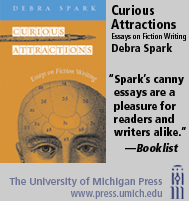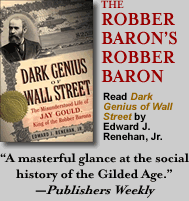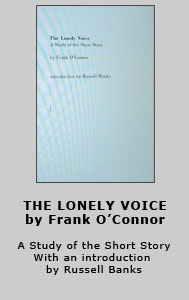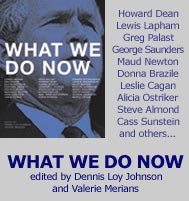

|
|
|

|
|
|
WHY ROBBER BARONS SELF–PUBLISH One of American history's most famous financial titans, Jay Gould, advised smart people to stay out of publishing. a MobyLives guest column by Edward J. Renehan |
|
| 25 JULY 2005 —While researching my latest book — Dark Genius of Wall Street: The Misunderstood Life of Jay Gould, King of the Robber Barons — I came upon a sidebar that might be of interest to my colleagues in the business of authoring and publishing books. It appears that Gould — who died in 1892 at age 56 after mastering the Union Pacific, the Missouri Pacific, the Western Union, the Manhattan Elevated, and other related properties totaling a value of some $72 million — took a dim view of publishing as a trade. Although he once briefly owned a newspaper (The New York World, which came as part of a deal for a railroad Gould was more interested in possessing), he otherwise refrained from any business dealings that involved media of any kind. Gould's rationale for his anti–publishing bias is best documented in the record of his association with another remarkable character. It was in the offices of the Western Union in the early 1880s that Gould first made the acquaintance of a thoughtful, bright, well–trained stenographer whom he made his personal secretary and sought to mentor. One year later, when the 19–year–old Edward Bok — destined for a long and highly successful career in magazine and book publishing — gave Gould his notice, the mogul offered him a large raise to remain with the firm. In answer, Bok explained that the salary, while of importance, did not interest him so much as his desire to secure a position in another field to which he aspired. "And what business is that?" Gould asked. "The publishing of books," replied Bok, who years later wrote up the conversation in his Pulitzer–prize winning memoirs, The Americanization of Edward Bok. "You are making a great mistake," Gould answered. "Books are a luxury. The public spends its largest money on necessities: on what it can't do without. It must telegraph; it need not read. It can read in libraries. A promising boy such as you are, with his life before him, should choose the right sort of business, not the wrong one." Nevertheless, after Bok insisted, Gould wished the boy well and even gave him a bonus check as a going–away gift. Seven years after that conversation, fate led Bok to another encounter with Gould. During 1889, Bok was helping sail a yacht on the Hudson one afternoon when the sight of Jay Gould's Lyndhurst estate "awakened the desire of the women on board to see [the] wonderful orchid collection" housed in Gould's famous greenhouse. Upon hearing this, Bok explained his previous association with the financier and offered to recall himself to Gould in an attempt to gain access to the grounds. Soon one of the young men of the party — not Bok — rowed to shore bearing a note for Gould, and shortly the answer came back that they were welcome to visit the greenhouse. Gould himself received the sailors. Then, after placing the balance of the group under the personal care of his chief gardener, Ferdinant Mangold, Gould pulled Bok aside for a chat. "Well," said the financier, once the others were gone, "I see in the papers that you seem to be making your way in the publishing business." When Bok expressed surprise that Gould had followed his work, Gould answered: "I have because I always felt you had it in you to make a successful man. But not in that business. You were born for the Street [Wall Street]. You would have made a great success there, and that is what I had in mind for you. In the publishing business you will go just so far; in the Street you could have gone as far as you liked. There is room there; there is none in the publishing business. It's not too late now, for that matter." Bok declined the offer. It should be added that he was always more than content with his career in the world of literature, just as he was always grateful for Gould's genuine interest in him and his prospects. Ironically, Gould made his own first mark in the world as a self–published author. In 1856, when he was just twenty years old and still living in the rural Catskills hamlet where he'd been raised — Roxbury, in New York's Delaware County — Gould researched, wrote and published History of Delaware County and the Border Wars of New York, a detailed and still–much–respected work of regional lore. Furthermore, Gould's best friend from boyhood was his Roxbury neighbor, John Burroughs (1837–1921), who served as one of Walt Whitman's intimates over the course of thirty years, authored close to thirty volumes of literary criticism and nature appreciation, and became one of the most highly respected writers of his generation. "It is a curious psychological fact," Burroughs wrote after Gould was dead, "that the two men outside my own family of whom I have oftenest dreamed in my sleep are Emerson and Jay Gould; one to whom I owe so much, the other to whom I owe nothing; one whose name I revere, the other whose name I associate, as does the world, with the dark way of speculative finance." And so it goes. Edward J. Renehan Jr. is the author of The Kennedys at War (Doubleday, 2002), The Lion's Pride (Oxford University Press, 1998), The Secret Six (Crown, 1995) and John Burroughs: An American Naturalist (Black Dome Press, 1992). His comments on history, book technology, and the art of biography appear regularly in The Wall Street Journal, American Heritage, on C–Span and the History Channel, and on his website. Link to this column. ©2005 Edward J. Renehan Previous columns: KADARE IS NO SOLZHENITSYN . . The winner of the first Booker International Prize trashed "untrue" dissident writers for keeping silent. Guest columnist Renata Dumitrascu asks if he was really part of their suppression.< GOOGLIZATION AND YOU . . Librarian Christopher Allen Waldrop says in a guest column that Google Print does more than break copyright laws — it opens the records of patrons up to more widespread scrutiny than the PATRIOT Act. BOOKSELLER AT LARGE . . . Guest commentator Dan Bloom says he moved to Taiwan and wrote a book that sold thousands of copies — after he took to the streets yelling, "Buy my book!" ENOUGH ALREADY WITH THE MFA BASHING . . . Regular contributor Steve Almond, an MFA grad who also teaches creative writing, responds to Elizabeth Clementson's column about the influence of MFA programs. DOWN WITH MFAs . . . In a guest column, MFA dropout and publisher Elizabeth Clementson say MFA programs are ruining literature and the publishing buisness. Opinions expressed in guest columns are not necessarily those of the management of MobyLives.com. |

|
||
|
Don't want to register for a site but need log on i.d.s and passwords? Get them at BugMeNot.com. MobyLives towers above all other literary weblogs. — The Complete Review Friday 29 July 2005 CIA charged with blocking book by former operative who says they let Bin Laden get away . . . "The CIA is squelching publication of a new book detailing events leading up to Osama bin Laden's escape from his Tora Bora mountain stronghold during the U.S.–led invasion of Afghanistan, says a former CIA officer who led much of the fighting," reports an Associated Press wire story. The AP's Katherine Shrader reports that in a Federal lawsuit, Gary Bernsten says that "the CIA is over–classifying his manuscript and has repeatedly missed deadlines written into its own regulations to review his book." Bernsten says the book, Jawbreaker, "recounts the attacks he coordinated at the peak of the fighting in eastern Afghanistan in late 2001, including how U.S. commanders knew bin Laden was in the rugged mountains near the Pakistani border" but yet failed to capture. It's a story strikingly similar to allegations made by then –presidential candidate John Kerry that "the United States had missed an opportunity to capture or kill bin Laden because they had 'outsourced' the fighting to Afghan warlords." But Bernsten, a "Republican and avid Bush supporter," says "the debate and discussions on Tora Bora were — from both sides — completely incorrect," but he would not reveal anything further. Bernsten hopes to publish the book in October, although the CIA has already "more than twice the 30 days allowed by regulation" to review his book. Foetry shocker: Georgia concedes everything, Georgia concedes nothing . . . The impact of Foetry.com continues to reverberate throughout the poetry world with a shocker from the University of Georgia Press: after 25 years it has decided to end its prestigious Contemporary Poets Series prize. The undated announcement, apparently just placed on the UGP website, does not say why, but the series has been awash in scandal for months since the revelation — uncovered by Foetry — that in 2000 anonymous guest judge Jorie Graham, with the collusion of long–time series editor Bin Ramke, selected Graham's husband, Peter Sacks, for the award. Ramke has since resigned his position of 22 years, and Graham has announced she will no longer judge poetry contests. The UGP announcement makes no recognition of the situation, nor addresses any concern for those who paid to enter the contest in 2000, nor clarifies whether there would be a subsequent investigation to see if the contest had been fixed in other years. The announcement does, however, salute Ramke and announce, "we are currently exploring an idea for a new series." Berlusconi suing British writer over book about the Mafia . . . Italian prime minister Silvio Berlusconi "is suing a British author and the Italian publisher of a book exploring corruption and organised crime in Italy" for more than €1million ($1.2 million), according to a report in the Guardian attributed to "agencies in Rome." The book in question is Berlusconi's Shadow: Crime, Justice and the Pursuit of Power by David Lane, published in the UK by Penguin, but Berlusconi is suing the Italian publisher Editori Laterza, which published the book in translation as L'Ombra del potere. The Guardian report says "The book looks at Mafia, organized crime and corruption in Italy," but the "Mr Berlusconi's camp have not clarified the basis for the defamation suit." Lane also writes for the Economist magazine, which Berlusconi sued for libel in 2001 after an article labeled him "unfit to lead Italy." Award winner earns prize for honesty . . . A controversy has broken out in China over the winners of one of the country's most prestigious literary awards, the Mao Dun Awards. As a China Daily story reports, "some critics" have charged that two of the winners this year "fail to meet the standards of the Mao Dun Award." The books in question are The Era of Heroes and The Sky of History. What's more, at least one of the authors has admitted the critics may have a point. The report says Era of Heroes author Lieu Jianwei "is the first to admit that some parts of his book need further attention." Scientists prove you CAN be a dissident and oppress dissidents simultaneously . . . In a bizarre commentary for The Prospect, Julian Evans admits recent Man Booker International winner Ismail Kadare was a part of the brutally repressive government of dictator Enver Hoxha and yet hails Kadare as "a worthy laureate." Evans argues that Kadare was writing critically of the Hoxha regime in novels he smuggled out of the country to publish in France (although Evans does not explain why there were no repercussions for those books against Kadare in Albania) and says he may have owed his survival to the fact that he came from the same small town as Hoxha. Simultaneously, Evans also points out that Kadare's "cohabitation" with the Hoxha government was so widely criticized in Albania it "led to his being dubbed the 'official dissident.'" Big publishing decides to read slush piles again after practical joker claims to have clipped twenty dollars to his manuscript . . . Starting a new job in the editorial department of a London publisher in 1984, the instructions awaiting the new employee were simple: "Open all unsolicited manuscripts. Log them in the slush pile book. Read them and reject them." Now, as the anonymous editor reports in a story for The Daily Telegraph, "Twenty–one years later, the climate appears to be changing. Publishers are increasingly alert to sources of undiscovered gems that in the past might have slipped through the net. The slush pile is one, word of mouth another, as well as books being launched by risk–taking small or independent publishers." Yet another way publishing could follow the model of the movie business . . . "In the book world, it is forbidden and uncouth to publish one's own work," observes Brian Robert Hischier in a commentary at The Antipodes. "A work without the guidance of an editor is like a child born of its own devices. It is possible, but unpleasant. Why, then, is the same practice encouraged and embraced in filmmaking, where it is a joyous (and common) act of creativity for a filmmaker to produce his own films? Why do we allow a screenwriter to produce, direct and edit his own film, then praise him as an auteur when the film proves interesting (as it occasionally does)? This seem to be an absurd double standard in the Reception of Art." The modern writer works on his novel . . . Writers have always battled distraction, but there seem to be more distractions closer at hand than there used to be. At least, that seems to be one of the things under consideration in a new entry on Reader of Depressing Books in which the site's author, Tao Lin lists the daily components of working on his novel: "1. get coffee and drink half of it 2. check e–mail 3. check some other things 4. check my other e–mail and download the manuscript of my novel 5. get up and go to the bathroom 6. sit back down at the computer 7. check e–mail 8. maximize the manuscript of the novel in microsoft word 9. begin to read it 10. feel a little uninspired 11. check e–mail 12. feel bad that there are no new e–mails . . . " NOTE: Daily newspapers often change URLs when archiving, so some links won't work beyond the day they're first posted. Thursday 28 July 2005 British government threatens to ban yet another critical book by a former diplomat . . . Once again, the British Foreign Office is threatening to ban the book of a former diplomat member who has criticized the government of Tony Blair. As a Guardian story by David Leigh reports, the author in question is former UK ambassador to Uzbekistan Craig Murray, who has written a book saying British intelligence agency MI6 "was taking information via the CIA obtained by torture" in Uzbekistan. Murray, who once opposed foreign secretary Jack Straw in an election, says the use of such intelligence "is morally, legally, and practically wrong." Some in the diplomatic corps have countered that "they did not know for a fact whether informants had been tortured," but Murray says "I will not attempt to hide my utter contempt for such casuistry, nor my shame that I work for an organisation where colleagues would resort to it to justify torture." Refusing to submit his book for censorship barely a week after former UN ambassador Sir Jeremy Greenstock had sections of his book blocked by the FO, Murray says he is taking legal action of his own against the government: "So if you want to take action under the Official Secrets Act, I suggest you get on with it". Amazon still in debt, but back in the good graces of Wall Street . . . "For the first time in recent memory, Amazon.com has handed investors a surprise — the positive kind, that is," according to a Business Week report by Robert D. Hof. "After a seemingly interminable string of earnings disappointments, the online retailer on July 26 reported better–than–expected earnings and sales for its second quarter." According to the report, "Investors went wild." Says one analyst, "It's amazing how long the negative sentiments have lingered. But they had a good quarter." Catholic official scoffs at whacko theory, says paintings are only about pregnant virgins . . . "One of the most intriguing traditions in western art," that of painting pregnant Madonnas, a tradition that was "almost entirely confined to Tuscany in the 130 years ending around 1467," is the subject of a 40–page booklet that is already causing a stiir within the Roman Catholic Church. As a Guardian story by reports, Italian author Renzo Manetti says the tradition is linked to the fact that the region was a major center for the Knights Templar, a group that was banned and persecuted by the Catholic Church. Manetti notes that the tradition ended abruptly with one painting, by the great Piero della Francesco. Manetti says it may also be related to "a group of former warrior monks and their associates in Florence had founded a new order, of St. Jerome, which was generously endowed by rich Tuscan families who had previously been close to the Templars." In a response "splashed" across major newspapers, Father Giocanni Alpigiano has replied on behalf of the Catholic Church, which famously tortured and burned at the stake captured Templars. Alpigiano's response "argues for the traditional view that the expectant virgins represent the theological concept of incarnation." Says Alpigiano, "Great care needs to be taken in attempting to rewrite the history of art or literature solely with the help of esoteric clues." Writes the Guardian's Hooper, "As the dispute gathers momentum, one question remains so far unanswered. What does Mr Manetti believe was the true secret these great artists thought they were alluding to?" Manetti says he'll explain in a book later this year. Resistance is futile . . . "The New York Times, known for its best–seller list and crossword puzzles in addition to the news it prints, has now lent its name to a bookstore. And the first New York Times bookstore won't be in New York, Los Angeles or even Chicago. It will be here at Lexington's Blue Grass Airport," notes Jennifer Hewlett in a Lexington Herald–Leader report. The 1,738 square foot store will sell books from the New York Times Bestseller List, and will also have "a children's section; an online station allowing people to log onto The New York Times Web site; a plasma screen television running programming from the Discovery Times Channel, book–related videos, and news and documentaries produced by The New York Times; and New York Times souvenirs and gifts. Of course, the newspaper itself will be for sale there." Says an excited Blue Grass Airport official, "Within a year or two they'll be peppered across the country." Unfortunate manias . . . Followers of international politics who have noted the current political turmoil in the Philippines may take in interest in a story from the Manila Bulletin, which notes what might be at the root of the country's recent woes: "Of all the items in the national budget, that of libraries is the most niggardly." The article, written by an anonymous former government official, says, "As I recall, during my stint with government, every time 'austerity' was announced, the first cut was on the purchase of books." Says the writer, "This brings to mind the proud assertion of the pompous rector of Universidad de Cervera to Ferdinand VII of Spain (quoted by Isabel Allende in her novel Zorro): 'The last thing we espouse is the unfortunate mania for thinking.' On the part of our leaders, they do not espouse the unfortunate mania for reading." Why more and more readers are saying, "I'd like to buy a Vowell" . . . Identity Theory's Robert Birnbaum's latest interview is with Sarah Vowell. They talk about the complicated process of writing her newest book, Assassination Vacation, about the craft . . . and what's next: "RB: Do you entertain any thoughts about writing fiction? SV: [sharply] No. RB: Because? SV: . . . I came to writing by studying art history and writing essay exams. So I don't know how to make stories up. . . . One reason I like writing nonfiction is [that] it's all about the implausible. . . . All these weird coincidences. And bizarre occurrences. With nonfiction it's like, 'Holy cow, I can't believe this thing happened!' Whereas fiction seems to me, for it to work, it actually has to seem kind of plausible. Which I would find incredibly difficult." NOTE: Daily newspapers often change URLs when archiving, so some links won't work beyond the day they're first posted. Wednesday 27 July 2005 Homeless man about to hear from long–lost family . . . A homeless man who has lived on the streets of Queens, New York, for a decade "is banking on an unlikely ticket off the street: a book deal. Sounds crazy? Tell that to his agent," writes Matthew Monks in a story for Newsday. He reports that after the man, who calls himself Cadillac Man, was befriended by a neighbor who turned out to be a former editor for Esquire magazine, some of his writing ended up in the magazine, where it was spotted by literary agent Sloan Harris of International Creative Management. "I thought it was stunning," says Harris. "Sitting on a chair beside his 'Cadillac Mobile,' a shopping cart crammed with sweaters and paperbacks," Cadillac Man, 56, tells Monks, "My book will be published some day and people will learn from it. Maybe treat us differently. It's strictly autobiographical, and it's about my life out on the streets." He says of his work now, "It looks so strange when it's type–written." As for what he hopes for in the book deal? A place in Astoria. "All I want is a room. Basically, just to bed down. I'll still be out here every day, meeting and greeting people." A New York Daily News report, meanwhile, notes that Cadillac Man's also seems on the verge of a movie deal. Cadillac Man tells Daily News reporter Oren Yaniv that what happened to him was "just a bunch of bad luck." He says, "I've lost everything I loved in my life. Everything." Yaniv reports Cadillac Man "grew up in Hell's Kitchen, married twice and has three daughters with whom he's not in touch." Yanive also reports that Cadillac Man would not reveal his real name. Says Cadillac Man, "the past is dead." Too big to get out the door, B&N may have to stop eating for a while . . . Has Barnes & Noble grown as much as it can? An Associated Press wire story notes that B&N shares "declined slightly in Monday trading after Goldman Sachs cut its rating on the nation's largest book retailer, citing a recent run–up in stock price." The report observes that B&N's stock value "has rallied over the past year, as the company took steps to improve its financial condition, including spinning off video game chain Gamestop and buying back debt and stock." However, B&N shares are already "at a premium of 34 times its average stock price over the past two years." Says a Goldman "client note": "We do not see the kind of earnings growth opportunity that would typically support this kind of premium. At this point, valuation appears extended." McMillan: Handling it well . . . Terry McMillan is on tour trying to support her new novel, The Interruption of Everything, but she keeps running into the question: "how could she not know through six years of marriage that the inspiration for How Stella Got Her Groove Back, her best–selling novel turned into a popular movie, was gay?" As Cassandra Spratling of the Detroit Free Press notes, McMillan's husband, Jonathan Plummer, is "trying to get out of a prenuptial agreement and get a big chunk of her money," after waiting "until the book was coming out to reveal he was gay." In an interview with Spratling, McMillan says, "I was devastated at first because I couldn't believe the level and extent of the betrayal. This feels like I've been raped. I've been violated." Referring to men who hide their homosexuality from their wives or girlfriends, McMillan says, "I'm going to make sure, do whatever I can, to make this down–low thing a crime. Men who have girlfriends or wives and have sex with men without the girlfriends' or wives' consent, it should be a crime." Reasons to read, # 46 . . . Reflecting on a deceased friend who was a Conservative, Scott McLemee ("a portrait of Lenin . . . looks down on me now, here in my study at home") considers a notion raised by Wesley McDonald in his book, Russell Kirk and the Age of Ideology: the idea of an "inner check," which is "that factor in the soul that can subdue the more vicious parts of one's nature — in the interest of the common good, and of the higher human potentialities." In his newest column for Inside Higher Ed, McLemee discusses his nurturing of this notion through reading, explaining that "my reading diet now includes a certain amount of right–wing intellectual output — journals like The Modern Age and The Claremont Review of Books, for example, and books by Russell Kirk, Michael Oakeshott, and Willmoore Kendall. It's not necessary to enjoy this stuff, or to agree with it. But it does seem important as part of the process of thinking outside one's familiar ruts." When Potter fans get angry, phase one . . . After panning the new Harry Potter book in a San Francisco Chronicle review — "It's not that Harry Potter and the Half–Blood Prince is dull, exactly. In places, it rises to a pitch resembling suspense, or at least a passing curiosity about what might happen next. No, the main problem is that J.K. Rowling has now written six of these bricks." — David Kipen has now recanted: "I was wrong. Harry Potter and the Half–Blood Prince is a masterpiece of all–ages literature that ranks alongside The Lord of the Rings and The Wind in the Willows." Actually, he goes on in a new Chronicle commentary, he still isn't crazy about the book. "But when it turns out that expressing reservations about the Potter phenomenon can buy you a death threat, it's worth asking: Is this degree of protective devotion some form of mass hysteria, or a hopeful development in otherwise unreaderly times?" Even his 10–year–old niece wrote in to complain, he says. She called his review "a pile of rubble" — a phrase which, says Kipen, "for my money, represents a more surprising and memorable use of language than anything in Harry Potter and the Half–Blood Prince." When Potter fans get angry, phase two . . . In a story that no other news source seems to have picked up, the Watley Review is reporting that a disgruntled fan has released a "corrected" version of the newest Harry Potter novel on her website, where it has led to over 800,000 downloads and "a storm of legal activity from Rowling's publishers." The story says Mary Sue Pembroke wrote the new version of J.K. Rowling's Harry Potter and the Half–Blood Prince because, "Whenever an author puts a work out into the universe, it is no longer their exclusive property anymore. Harry Potter belongs to all of us, not just Rowling. She took some liberties with the story in this latest book that really weren't faithful to the logic of the narrative. My version is, I think it fair to say, much more faithful to the true Harry Potter mythos." Careful what you wish for . . . Nine months after one of last year's biggest books, Unfit for Command, was a central component in the successful campaign to defeat John Kerry for the presidency, the authors of that book say "they miss attacking the Massachusetts senator on a daily basis and that their lives now lack meaning and purpose." According to a report by Andy Borowitz on The Borowitz Report, Davis Debrew, "a swift boat vet who appeared in no fewer than twenty on–air spots excoriating the senator," has now "organized a support group called Veterans of the Swift Boat Veterans for Truth." Says Debrew, "Some of the guys strongly believe that there's nothing wrong with us that producing a series of new anti–Kerry ads wouldn't fix." NOTE: Daily newspapers often change URLs when archiving, so some links won't work beyond the day they're first posted. Tuesday 26 July 2005 In Letters: On Kadare, dissidence, and vulgarity . . . Guest columnist Renata Dumitrascu writes in to counter reader Wayne Miller's defense of Ismail Kadare . . . in the MobyLives letters section. Alimentary, my dear Watson . . . The creator of Sherlock Holmes, author Sir Arthur Conan Doyle, "was himself a murderer and a thief," says a group of "literary sleuths" in England who "plan to prove their claim with a macabre exhumation in a Devon churchyard." It's all about a theory that Doyle was "involved in a dark plot to bump off a former editor of the Daily Express — the man who should truly be acknowledged as the creator of The Hound of the Baskervilles," reports Anthony Barnes in a story for The Independent. Doyle wrote in the book's intro, "This story owes its inception to my friend Fletcher Robinson who has helped me." But a scientist named Paul Spiring believes Robinson contributed more to the book than Doyle wanted known, and that the famous author conspired to murder Robinson by poisoning him with the aid of his wife. Spiring says he plans to "make a formal application to the Diocese of Exeter to dig up Fletcher Robinson's corpse," but that already, "If you take a purely objective, scientific view of our findings, the evidence of a cover–up is irrefutable." RIP: Edward Bunker, aka Mr. Blue . . . Edward Bunker, who turned his life around after publishing a novel while in prison, then went on to write more successful books and act in movies such as Reservoir Dogs once he got out, has died in Burbank, California at age 71. According to an Agence France Presse wire story, Bunker was a diabetic who died from "complications arising from surgery to improve circulation in his legs." As the story notes, his "hard–boiled and unapologetic crime novels were informed by his personal experiences in a society of criminals in general and by his time in the penal system in particular." Among his books were The Animal Factory, Little Boy Blue, and Dog Eat Dog. He also appeared in the films The Running Man and Tango and Cash. He was "Mr. Blue" in Reservoir Dogs. May the best really rich person win . . . It seemed, at first, that one of the world's richest women had won in her fight against an aristocratic author: lawyers for Lily Safra, reportedly worth over a $1 billion, convinced Arcadia Books to withdraw the already published Empress Bianca by Lady Colin Campbell from bookstores and to even destroy the unsold copies. As Anthony Barnes and Nicholas Pyke report in a story for The Independent, Safra "claimed the main character in Lady Colin's debut novel, Empress Bianca, was a defamatory, thinly disguised version of her life." But in response, they report, "Lady Colin has gone on the offensive, branding her antagonist a 'vulgar' publicity seeker," and "threatening to counter–sue" if Safra doesn't relent and allow the book back into bookstores. Meanwhile, says Arcadia's Gary Pulsifer, "We're a small, independent publisher and we're too small to fight something like this." So is the protagonist of the book modeled on Safra? Says Campbell, "[I]f she recognises herself and thinks the cap fits, let her wear it." Danticat says take a look at Haiti for a perspective on Iraq . . . In a commentary for The Albany Times Union, Edwidge Danticat proposes the American invasion of Haiti in 1915 as a cautionary tale: "By the end of the occupation, more than 15,000 Haitians had lost their lives. A Haitian gendarmerie was trained to replace the U.S. Marines, then proceeded to form juntas, organize coups and terrorize Haitians for decades. . . . Ninety years later, there are many, including some current foreign policy experts, who maintain that Haiti, like recently occupied Iraq, should be declared a failed state." Says Danticat, "Iraq, take heed." Successful promotion campaign leaves customers feeling queasy . . . It started when struggling Portland artist//writer ayo damali complained to her mother that she was "fed up, feeling people only valued her because of her race." Her mother, quoted an old joke by sixties comedian Godfrey Cambridge: "Well, you can't be everyone's Rent–A–Negro." As Florangela Davila reports in a Seattle Times profile, "And ayo, never shy about speaking her mind, ran with the idea." To wit, she's now published How to Rent a Negro, a book of "biting satire with billing tips, contract language, sample invoices, even a 'frequent rental' card." Davila, covering damali for an appearance at Seattle's Elliot Bay Bookstore, reports "Reaction to the book is visceral." She says damali, recalling Jonathan Swift's A Modest Proposal, explains, "I'm really trying to get people to think. And with satire, you want that humor but you want that sting. You want that 'Oh, I feel sick to my stomach' feeling." The subtitle that changed the world . . . "For several years, nonfiction titles containing the words 'changed the world' (or a variation thereon) have become a publishing standby," to the degree that the phrase "has become enough of a publishing convention to have mutated," observes Mark Feeney in a Boston Globe article. Feeney says the book "widely credited with popularizing it" was the surprise 1997 bestseller, Cod: A Biography of the Fish That Changed the World, by Mark Kurlansky. Now, mutations have grown to include everything from the subtitle of Ken Alder's book about the metric system, 'The Measure of All things: The Seven–Year Odyssey and Hidden Error That Transformed the World, to that of Lisa Wood Shapiro's 2004's How My Breasts Saved the World: Misadventures of a Nursing Mother. Kurlansky has a theory: ''I am of that '60s generation," he says, ''and for people of my age that phrase 'change the world' has a real resonance . . . I think it's pretty appealing to change the world." Meanwhile, the Globe includes a list of recent books using the phrase, including Mauve: How One Man Invented a Color That Changed the World, and Twist: The Story of the Song and Dance That Changed the World. NOTE: Daily newspapers often change URLs when archiving, so some links won't work beyond the day they're first posted. Monday 25 July 2005 ALA head declares revived PATRIOT Act "Kafkaesque" . . . In response to last Thursday's vote by the U.S. House of Representatives to reauthorize 16 provisions of the USA PATRIOT Act, including the clause requiring librarians and booksellers to secretly hand over customer records, the head of the American Library Association has called the Act "Kafkaesque." According to a Reuters wire story by Deborah Zabarenko, ALA president Michael Gorman says, "It's very reminiscent of the '50s and the 'red scare' where people showed up at libraries trying to find which political books professors had read, because they were going to be put on a communist list or something." He added, "I'm much too fond of Orwell to call it Orwellian, but it's Kafkaesque." Faulkner prize winner being censored for criticizing Bush, says Faulkner family . . . "A scathing parody that likens President Bush to the 'idiot' in William Faulkner's novel The Sound and the Fury has won this year's Faulkner write–alike contest," but Faulkner's family is accusing the sponsor of the contest, Hemispheres, the in–flight magazine of United Airlines, with censorship for refusing to publish the piece in the magazine. According to an Associated Press wire story by Emily Wagster Pettus, Larry Wells, who organizes the Faux Faulkner awards with his wife, Faulkner's niece Dean Faulkner Wells, says, "One of the things they asked was that we didn't have profanity or any obvious sexual content. We watch for that. But anything else, like a political subject, was funny, it was parody. ... We felt that that shouldn't be censored." The magazine, which denies the charges and says it has posted the story instead on its website, has also announced it will end its sponsorship of the annual awards. In the winning story, by Sam Apple, Bush is cast in the role of Benjy, "the mentally challenged son — or, as Faulkner himself said, the 'idiot'," in a scene where he is shown being prepped for a press conference: "'Go and get him Saddam's gun,' Condi said. 'You know how he likes to hold it.' Dick went to my desk drawer and took out Saddam's gun. He gave it to me, and it was hot in my hands. Rummy pulled the gun away. 'Do you want him carrying a gun into the press conference?' Rummy said. 'Can't you think any better than he can?'" • MORE: Despite its refusal to publish it in its magazine, Hemispheres has made the entire story, "The Administration and the Fury," available at its website. UK publishers may take action against W.H. Smith . . . The likelihood of legal action against one of the UK's biggest bookselling chains, W.H. Smith, "appeared to increase this week as the retailer began telling publishers it will now accept orders only if they conform to its disputed terms and conditions." A Publishing News report says publishers contact "all were adamant there would be no capitulation." According to PN, "The assumption is that Smiths wants to put publishers in a position of refusing to fulfill orders," but as one publisher comments, "it's not for publishers not to supply — it's for Smiths not to order. If Smiths don't order, the trading relationship is ended." When is fiction "gay"? . . . Is it repressive to categorize books as "gay fiction," or to have specialized gay and lesbian bookstores? In a New York Times Book Review commentary last week, novelist David Leavitt argued that it's time to "retire the category" of the "gay novel," because we are living in a "post–gay" era, with numerous "novels and stories whose authors, rather than making a character's homosexuality the fulcrum on which the plot turns, either take it for granted, look at it as part of something larger or ignore it altogether." But in a response, Akashic publisher Johnny Temple says gay bookstores "play a vital function in today's relatively sterile retail environment." In his weekly Book Standard column, Temple says, "Progressive communities and subcultures need our institutions now more than ever, what with the Patriot Act, the senseless and tragic war, and Republican political domination." About the categorization of "gay novels," however, Temple says he shares with Leavitt some "skepticism." Says Temple, "Most of the queer authors I publish choose to leave the words 'gay' and 'lesbian' off their book jackets. The primary concern isn't that homophobic book–buyers will disregard them — it's that their books will be pigeonholed by booksellers and the media." Temple also observes that the problem is not limited to gay and lesbian literature: "Many black writers similarly yearn to escape being categorized by race." The continuing, er, influence of Papa Hemingway . . . Buried in an Associated Press wire story about this year's winner of the Ernest Hemingway look–alike contest held in Key West, Florida is the news that a previously unknown illegitimate son of the writer has recently come forth. As the AP's Laura Myers reports, Richard Hemingway, 44, who appeared at the look–alike competition (but not, apparently, as a contestant), "said he learned at age 43 that Ernest Hemingway was his father. His mother . . . told him the news shortly before she died. Ernest Hemingway secretly married his mother while living in Cuba, likely while also married to fourth wife Mary, and supported her financially, said Richard Hemingway, who described himself as a machinist, amateur inventor and poet and song writer." Richard Hemingway then "started using the writer's last name after being known as Richard Steel." Book makes incredible claim: American politicians weren't always evil dimwits . . . The story of the 1940 presidential campaign has a twist nobody has really pointed out before, says Charles Peters, the writer and editor best known for founding the Washington Monthly. As Todd S. Purdum explains in a New York Times story, "A conservative, isolationist Republican Party, incensed at the prospect of a third term for Franklin D. Roosevelt, nominates a liberal, interventionist political newcomer named Wendell Lewis Willkie. His moderate candidacy gives Roosevelt the cover he needs to pass a draft, swap American destroyers for bases from a beleaguered Britain and win re–election by five million votes." Peters, who has just published a book about it all called Five Days in Philadelphia: The Amazing 'We Want Willkie!' Convention of 1940 and How it Freed F. D. R. to Save the Western World, says, "At first I was just so fascinated with the story, and I wanted people to know that story, primarily to give Willkie the credit he was due. But as I was telling the story, I became more and more aware of the difference between that time and now, and I think the No. 1 thing I want to come out of the book is for people to see that difference and say: 'By God, we've got to do something about now. We can't go on the way we're going.'" NOTE: Daily newspapers often change URLs when archiving, so some links won't work beyond the day they're first posted. |
||

This week's
poetry:
RECENTLY
UNDER–APPRECIATED
 (from Beacon Press)
(from Beacon Press)

 (from Helen Marx Books)
(from Helen Marx Books)
 (from Basic Books)
(from Basic Books)
WHALE
SIGHTINGS
"Cowboy Poultry Gatherin"
by DARRELL ARNOLD
(from Western and Cowboy Poetry at the Bar–D Ranch)
"Summer at the Grandparents'"
by DANIELLE BURHOP
(from Licton Springs Review)
"Portrait of Soon"
by DEBORAH KEENAN
(from Dislocate)
This week's
fiction:
"Palimpsest"
by JOAN CONNER
(from Gettysburg Review)
"Ghost World"
by ERIC MIKLASEVICS
(from Double Dare PRess)
Special edition:
POEMS FOR THE TIME
First posted in October, 2001, Alicia Ostriker's anthology of poetry that she turned to after the 9/11 attacks — including the work of Stephen Dunn, C.P. Cavafy, Marianne Moore, and others — is far and away the most popular link ever posted on MobyLives. Find out why.
NEW FROM MELVILLE HOUSE BOOKS




RECENTLY
UNDER–APPRECIATED
 (from Helen Marx Books)
(from Helen Marx Books)
 (from Basic Books)
(from Basic Books)
FROM MELVILLE HOUSE BOOKS